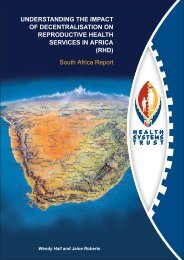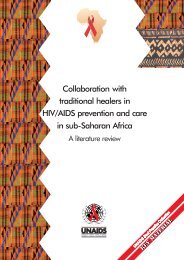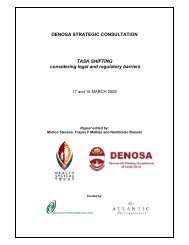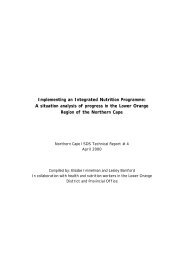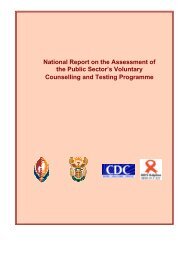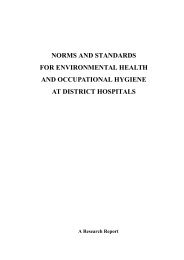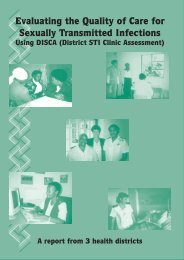PMTCT, and National's - Health Systems Trust
PMTCT, and National's - Health Systems Trust
PMTCT, and National's - Health Systems Trust
Create successful ePaper yourself
Turn your PDF publications into a flip-book with our unique Google optimized e-Paper software.
Figure 6.2.1: Nevirapine dispensing to HIV positive women in the pilot sites, 2002<br />
100<br />
%<br />
90<br />
80<br />
70<br />
60<br />
50<br />
40<br />
30<br />
20<br />
10<br />
0<br />
WC KZN NW LP FS GT MP EC NC Average<br />
There are a number of problems with the dispensing of nevirapine to HIV positive pregnant<br />
women:<br />
1. Inadequate patient information regarding correct nevirapine administration<br />
There were reports from some sites that women did not adequately underst<strong>and</strong> the<br />
regimen for nevirapine administration. This resulted in some women taking the tablet<br />
antenatally at the time it was dispensed <strong>and</strong> requiring a second dose when in labour.<br />
Some sites reported a high number of women who required nevirapine to be dispensed<br />
in the labour ward which suggests that tablets are not correctly self-administered or<br />
are lost, or that women forget to take the tablet when they go into labour.<br />
2. Lack of clarity regarding the dispensing of repeat doses to women<br />
The national <strong>PMTCT</strong> protocol for the pilot sites stipulates that in the case of false or<br />
prolonged labour nevirapine can be taken again 24 hours after the first dose at a<br />
subsequent onset of labour. A study conducted in South Africa showed that giving two<br />
doses of nevirapine to mothers results in a much higher rate of nevirapine resistance<br />
than one dose 4 . A circular dated 16 th of April 2002 was sent from the national<br />
Department of <strong>Health</strong> to provinces informing them, amongst other things of the revised<br />
nevirapine regimen. The circular states that women in prolonged or false labour should<br />
not receive a repeat dose of nevirapine. This evaluation found that in many facilities,<br />
midwives were not aware of the change to the protocol <strong>and</strong> this information did not<br />
appear to have been transmitted from provincial management to the facility level.<br />
3. Difficulties identifying HIV positive women in the labour ward due to non-disclosure<br />
The dispensing of nevirapine to HIV positive women in labour relies on the presence<br />
of a unique patient identifier or on the willingness of the woman to disclose her status<br />
to health workers. HIV positive women may be reluctant to reveal their HIV status in<br />
delivery rooms that lack privacy, or to staff that have not been involved in their antenatal<br />
counselling <strong>and</strong> care. This can result in missed opportunities for nevirapine coverage<br />
of HIV positive pregnant women.<br />
24



